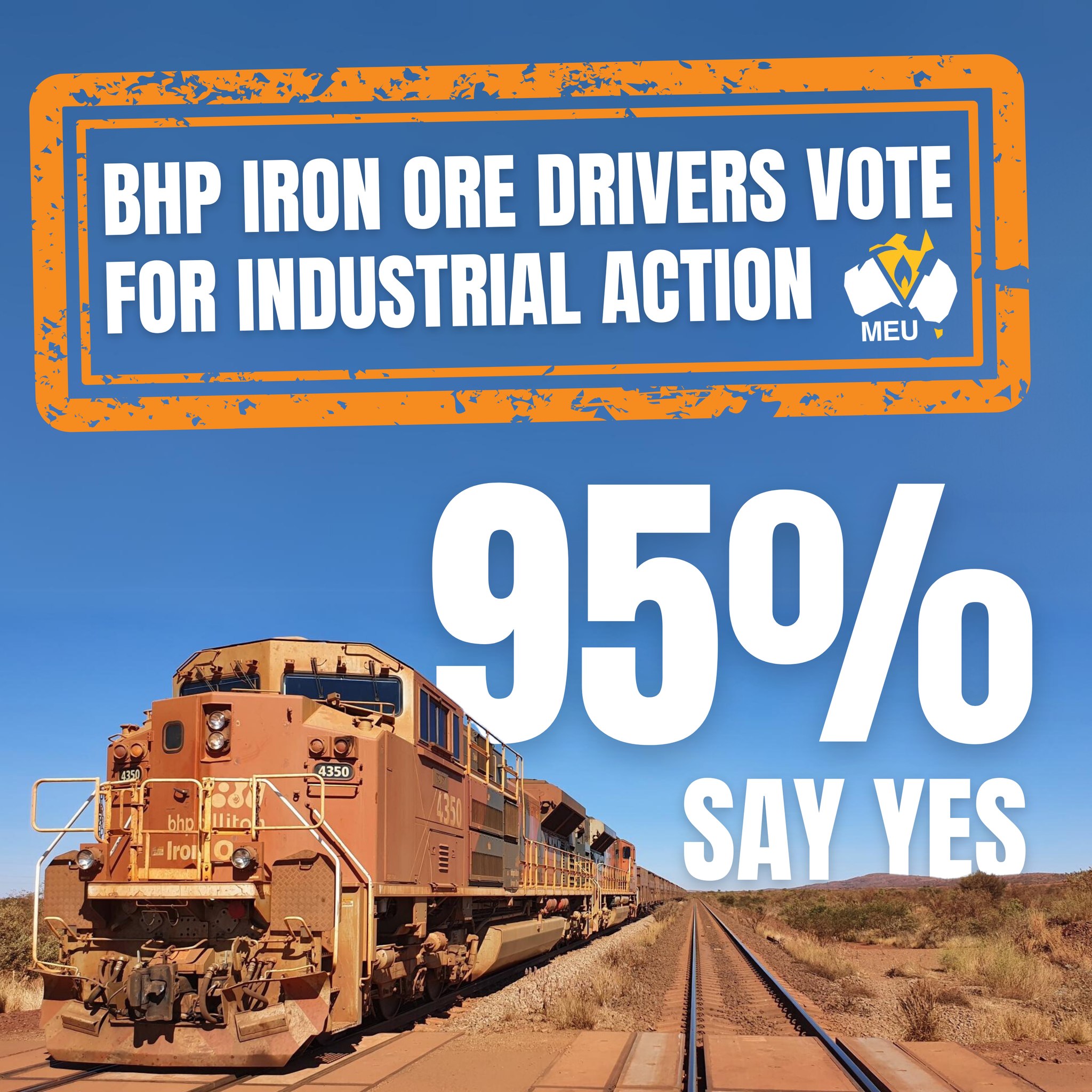Pilbara Train Drivers Take industrial Action Against BHP
Written by: Ned K. on 22 November 2023
About 400 train drivers in the Pilbara voted to take industrial action in pursuit of higher wages and better conditions. The train drivers transport iron ore from BHP owned mines to the coast for export to steel corporations in other countries, including China.
The industrial action started with train drivers banning the use of BHP's mobile app fr rostering.
The industrial action is significant. It is the first industrial action in the Pilbara region of this magnitude for 15 years. It comes at a time when last financial year the mining industry made a staggering $304 biillion in profits. In the last decade mining industry wages have gone up by 22% while in the same period mining industry profits went up by 200%.
These figures show that even though wages may be higher than in many other industries, they are low when compared with the surplus value and profits of BHP and other mining corporations. The latter come from the toil of mining industry workers like the 400 train drivers in the Pilbara.
The industrial action by the train drivers is occurring as the Labor Government's Closing Loppholes Bill crawls through the federal parliament.
The key element of the Bill is to prevent corporations like BHP using labour hire workers to cut wages by labour companies paying labour hire employees far less than the going rates paid to directly employed workers.
Like most Bills that go through parliament generated from workers through their unions, there are qualifications and limitations for the bosses' side.
The Bill provides that where the host employer (eg BHP) is covered by an Enterprise Agreement and engages labour hire through a labour hire company, an application may be made to the Fair Work Commission for a "regulated labour hire arrangement order". If the order is made the host employer has to pay the labour hire workers not less than the rate of pay applying under the enterprise agreement.
If the Bill becomes law, it does not apply in the first three months of labour hire. The Bill does not apply to what is described as "genuine service contractors". In the mining industry this will mean that where mining companies like BHP use other multinationals like Sodexo, Compass or Civeo or ISS to provide support services such as cleaning miners’ quarters or providing their meals in the mining site canteen, these workers will still be subject to cheaper labour rates than if they were directly employed by the host mining company.
Despite the conditional nature of the Closing Loopholes Bill, it is still a win through years of struggle by the working class against labour hire wage swindles.
The ACTU in their excellent research paper "Digging a Hole: Mining Boss myths about the Closing Loopholes Bill" estimates that about 600,000 labour hire workers will be better off if the Bill becomes law.
As with all gains won through workers’ struggles, the bosses will try and claw back and find ways around the new laws.
However the Pilbara train drivers’ collective action and the example they set to other workers is what the bosses fear most. It is when workers organize to defend and extend their interests that those bosses like BHP become most alarmed.
Print Version - new window Email article
-----
Go back
Independence from Imperialism
People's Rights & Liberties
Community and Environment
Marxism Today
International
Articles
| Public sector workers take on SA government |
| Courts uphold government attack on militant union |
| Support BAE shipworkers’ action for same job, same pay |
| Labor Sweeps to Power: Now It’s Time to Deliver for Workers |
| Dystopia and the Sacrosanct Elephant |
| Workers Strike at PepsiCo's Snack Foods Factory - An Example of The Leading Class In Action |
| ALBANESE DEFINES LABOR PARTY - "MAINSTREAM" and "REFORMIST NOT REVOLUTIONARY" |
| May Day Greetings from CPA (M-L) |
| NSW construction workers to march on May 1 |
| The Not-So Curious Incident of Low Wages Growth - Peetz report |
| VALE Wallace McKitrick: cultural fighter (1950-2025) |
| Don’t leave politics to the politicians! |
| SA Government Workers in Action in Struggle Against Rising Cost of Living |
| 8th March - International Women’s Day - Salute Women’s Struggle |
| Book Review: Culture and Imperialism |
| A Capitalist Parliament Won’t Get People Out of the Mess - Mass Struggle for People’s Power the only Solution to the Crisis |
| Unions say "Don't risk Dutton" but avoid issues of substance |
| Canberra airport guards fight for job security while overseas owned security contractors compete in "race to the bottom" at privatized airports |
| Union membership and workers’ struggle |
| Woolworths Warehouse Workers' Strike Shows Strength of United Workers |
-----

